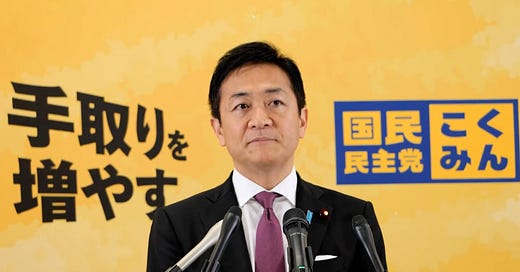Thank you for reading Observing Japan. This post is available to all readers.
If you are looking for timely, forward-looking analysis of the stories in Japans’s politics and policymaking that move markets, I have launched a new service through my business, Japan Foresight LLC. For more information about Japan Foresight’s services or for information on how to sign up for a trial or schedule a briefing, please visit our website or reach out to me.

It was just over a month ago that former prime minister Kishida Fumio made headlines when he suggested that Tamaki Yūichirō was potential prime minister.
How quickly political fortune can change.
The latest blow to Tamaki and his Democratic Party for the People (DPFP) came on Thursday, 12 June. After weeks of relentless criticism, Tamaki announced that Yamao Shiori, the former Democratic Party and Constitutional Democratic Party (CDP) lawmaker whose promising career was cut short over an alleged extramarital affair, would not be running as a DPFP candidate in next month’s upper house elections after all. In a press conference announcing the decision, Tamaki apologized and accepted criticism that he was slow to respond to questions about Yamao’s suitability from within the party and from supporters on social media.1 For her part, Yamao, while announcing that she will not be running and that she will leave the DPFP, used the occasion to question the party’s internal governance, a rebuke to Tamaki, who pushed for Yamao’s candidacy without securing his party’s acquiescence first.
While it may be an exaggeration to suggest that the DPFP is in free fall, the party’s bubble – which swelled after the DPFP gained seventeen seats and increased its proportional representation vote by nearly seven percentage points in last year’s general election – has plainly burst, nine days before the Tokyo metropolitan assembly elections and just over a month until upper house elections. Opinion polls reveal the extent to which public enthusiasm about the party has faded.
While the Yamao affair is the proximate cause, it is, as Yamao suggested, symptomatic of the broader problems with Tamaki’s leadership. While a charismatic – and, these days, social media-adept – leader can generate public enthusiasm and support, it can also leave their parties vulnerable to the leaders’ whims and personal shortcomings. Even setting aside Tamaki’s suspension from the DPFP’s leadership for three months due to his own marital infidelity, the DPFP has often seemed reckless, walking away from negotiations with the ruling parties over the income tax exemption, calling for a broad consumption tax cut to be financed by new debt, and goading the CDP to submit a no-confidence motion but resisting cooperation with the CDP.
Thus, despite the speculation that in certain circumstances Tamaki could find himself as the prime minister in a new coalition government after the upper house elections, it is difficult to see how any party – whether the CDP or the Liberal Democratic Party (LDP) and Kōmeitō – will trust Tamaki enough to want to be in government with him or under his leadership. The DPFP, which once seemed like the most obvious partner for Prime Minister Ishiba Shigeru to work with to resolve the minority government situation, now looks like the most difficult for the LDP to work with, not least now that the party has fully embraced fiscal stimulus even as Ishiba has strengthened his commitment to fiscal consolidation.
The DPFP is only the latest in a long line of Japanese political parties to learn about the ephemerality of the public opinion boomlet – and that long-term success will depend on that old standby, the Weberian routinization of charisma, trading some of the excitement of charismatic leadership for more stable, predictable, and trustworthy decision-making, all the more important as long as minority government gives opposition parties a greater role in the policymaking process.
In contrast to other populists, Tamaki appears more willing to apologize instead of doubling down. In recent weeks, he has apologized for pushing for Yamao’s candidacy; for insulting comments about rice from government stockpiles; and to medical professionals for the DPFP’s nominating a vaccine skeptic. While there is something to be said here about the role of apologies in Japanese political culture, and Japanese culture more broadly, Tamaki’s constant apologies increase the impression of erraticness.




